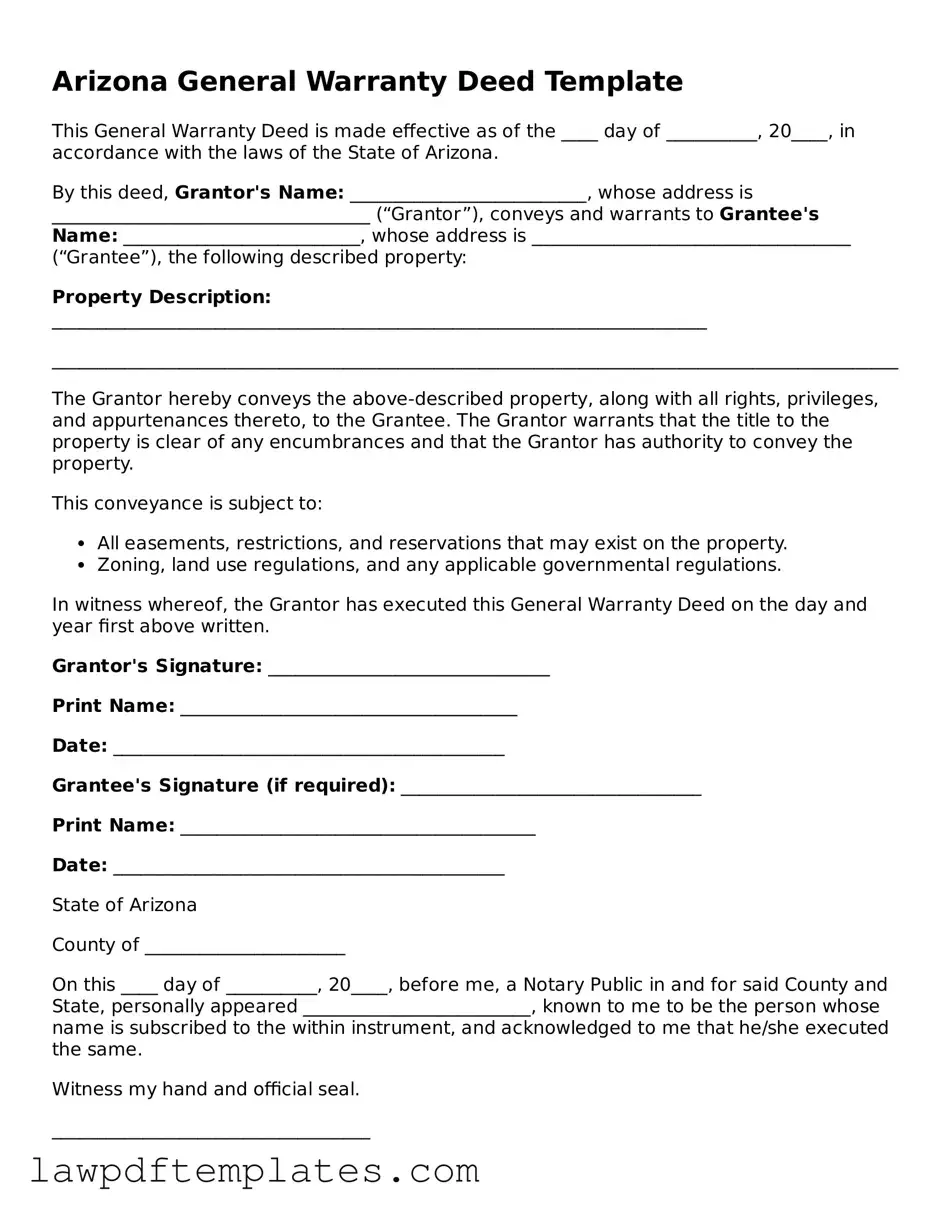Free Deed Template for the State of Arizona
Form Breakdown
| Fact Name | Description |
|---|---|
| Purpose | The Arizona Deed form is used to transfer ownership of real property from one party to another. |
| Types of Deeds | Common types include Warranty Deed, Quitclaim Deed, and Special Warranty Deed, each serving different purposes in property transfer. |
| Governing Laws | The Arizona Revised Statutes, particularly Title 33, govern the execution and recording of deeds in the state. |
| Signature Requirements | All parties involved in the transaction must sign the deed, and signatures must be notarized to ensure validity. |
| Recording | To provide public notice of the property transfer, the deed must be recorded with the county recorder's office where the property is located. |
| Tax Implications | Arizona imposes a transaction privilege tax on the sale of real property, which may affect the cost of the deed transfer. |
| Legal Advice | While individuals can complete a deed on their own, consulting with a real estate attorney is often recommended to navigate complexities. |
Sample - Arizona Deed Form
Arizona General Warranty Deed Template
This General Warranty Deed is made effective as of the ____ day of __________, 20____, in accordance with the laws of the State of Arizona.
By this deed, Grantor's Name: __________________________, whose address is ___________________________________ (“Grantor”), conveys and warrants to Grantee's Name: __________________________, whose address is ___________________________________ (“Grantee”), the following described property:
Property Description: ________________________________________________________________________
_____________________________________________________________________________________________
The Grantor hereby conveys the above-described property, along with all rights, privileges, and appurtenances thereto, to the Grantee. The Grantor warrants that the title to the property is clear of any encumbrances and that the Grantor has authority to convey the property.
This conveyance is subject to:
- All easements, restrictions, and reservations that may exist on the property.
- Zoning, land use regulations, and any applicable governmental regulations.
In witness whereof, the Grantor has executed this General Warranty Deed on the day and year first above written.
Grantor's Signature: _______________________________
Print Name: _____________________________________
Date: ___________________________________________
Grantee's Signature (if required): _________________________________
Print Name: _______________________________________
Date: ___________________________________________
State of Arizona
County of ______________________
On this ____ day of __________, 20____, before me, a Notary Public in and for said County and State, personally appeared _________________________, known to me to be the person whose name is subscribed to the within instrument, and acknowledged to me that he/she executed the same.
Witness my hand and official seal.
___________________________________
Notary Public
My commission expires: ____________
Common mistakes
Filling out a deed form in Arizona can seem daunting, but avoiding common mistakes can make the process much smoother. One frequent error is not including the correct legal description of the property. This description must be precise, detailing the boundaries and location. Without this information, the deed may be deemed invalid, leading to potential legal issues down the line.
Another common mistake is failing to sign the deed in the appropriate places. All parties involved in the transaction must provide their signatures. If one party neglects to sign, the deed may not be legally enforceable. It’s crucial to double-check that everyone has signed where necessary before submitting the document.
Many individuals also overlook the importance of having the deed notarized. In Arizona, a deed must be notarized to be considered valid. Notarization serves as a verification of the identities of those signing the document. Skipping this step can result in complications when trying to transfer ownership or sell the property in the future.
Additionally, people often forget to include the date of the transaction. While it may seem minor, the date is essential for establishing the timeline of ownership. Without a date, it can create confusion about when the property was transferred, which can affect future legal matters or disputes.
Lastly, some individuals fail to file the deed with the county recorder’s office. Even if the deed is filled out correctly, it must be officially recorded to ensure public notice of the property transfer. Neglecting this step can lead to problems if the new owner needs to prove their ownership or if there are disputes regarding the property in the future.
Discover More Deed Templates for Specific States
Georgia Quit Claim Deed - The Deed should clearly identify the property being transferred.
Release of Dower Rights Ohio Form - May involve a legal review before signing.
How Do I Get My Deed to My House - Deeds can facilitate the transfer of property in various situations, including sales, gifts, or inheritance.
For anyone handling property transfers in Georgia, understanding the nuances of the Quitclaim Deed process in detail is crucial. This form offers a straightforward means to relinquish property rights, making it indispensable for quick transactions.
How to Get House Deed - Deeds can also include covenants, which are promises related to the property.
